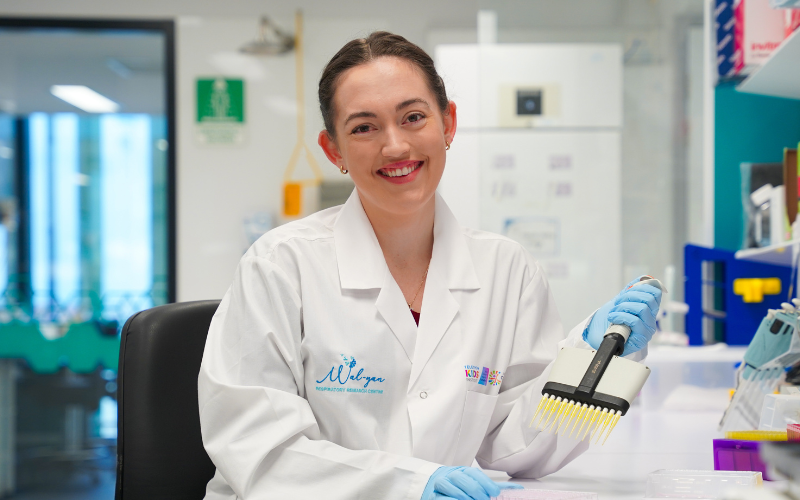
Wal-yan Respiratory Research Centre researcher Ms Denby Evans has been awarded one of four inaugural fellowships supported by the State's Future Health Research and Innovation (FHRI) Fund and Brightspark Foundation, enabling her to further her research into ways to improve the lung health of people born preterm.
In Western Australia, more than 3,000 babies are born too early every year, known as preterm birth. These babies face significant challenges, often staying in hospital for weeks or months until they are strong enough to breathe on their own.
Many of these children continue to have respiratory symptoms throughout childhood and new evidence from the Children’s Lung Health team at the Wal-yan Centre suggests that lung function gets worse throughout their lives. This means that the damage to the lungs is ongoing and needs treatment.
Ms Evans, also of Curtin University, will study the airways of premature babies with the aim of finding new treatments to improve the lung health of people born preterm.
“We don’t have any good treatments for stopping progressive lung disease after preterm birth,” said Ms Evans.
“My research aims to identify treatable traits for prematurity-associated lung disease in these children. A treatable trait or personalised medicine approach means patients are individually assessed for problems that might be causing disease.
Instead of looking at the disease overall, it allows us to focus and find treatments that target the underlying problems causing symptoms for individuals.
Ms Evans’ previous research has shown that the cells that make up the airway, called the airway epithelium, may be one of the underlying problems causing lung disease in children born preterm.
“This fellowship will enable me to collect and study the airway cells of children who were born preterm to identify what aspect of the cell structure and behaviour may be contributing to lung disease.
The findings from this study will be the first step towards new treatments to improve lung health after preterm birth – helping our smallest babies to grow up and live happy, healthy lives.
Ms Evans’ research career has been built around an interest in improving child health.
“Child health research has remained a passion of mine since I first undertook an honours degree in this area.
“I am 100 per cent committed to improving the lung health of babies born preterm, understanding the underlying mechanisms and designing interventions to improve their outcomes, both in the neonatal ICU and for the rest of their lives.”
The Fellowships program, co-funded by the WA Government's Future Health Research and Innovation (FHRI) Fund and the Brightspark Foundation, has been established to ensure emerging local expertise in research and innovation stays in Western Australia.
The Wal-yan Respiratory Research Centre is a powerhouse partnership between The Kids Research Institute Australia, Perth Children’s Hospital and Perth Children’s Hospital Foundation.
Ms Evans’ research track record
Ms Evans is an early-career researcher, completing the final year of her PhD studies. She has an outstanding track record for her career stage, having published multiple first-author papers in high-impact journals and receiving more than 15 awards at local, national, and international levels based on her PhD outputs. These include multiple New Investigator awards, most recent of which was the 2023 ‘Ann Woolcock’ award from the Thoracic Society of Australia and New Zealand and considered Australia’s most prestigious early career award in respiratory health. This year, Ms Evans won the 2023 Premier’s Science Award for the Student Scientist of the Year category.
